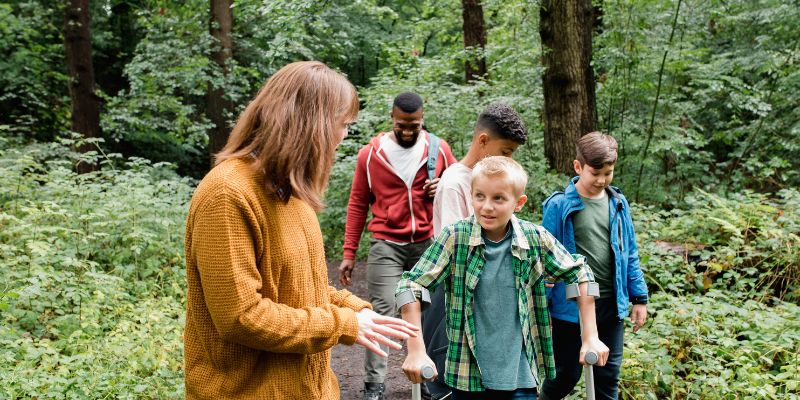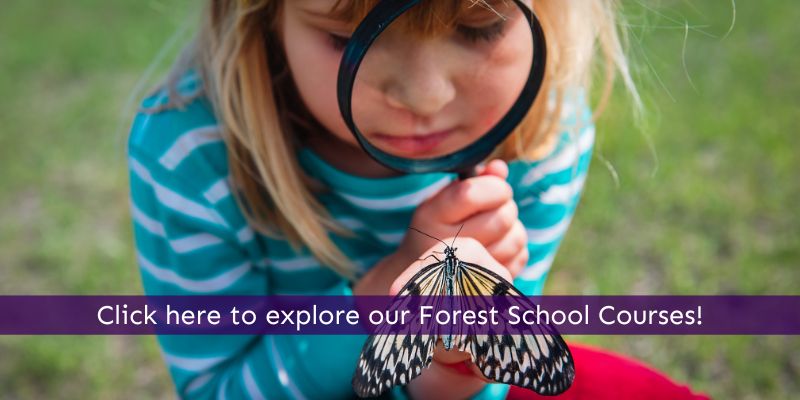With conservation and sustainability at the forefront of everyone’s minds these days, there’s never been a better time to understand our natural environment, and what it needs to thrive.
To help people get on board with the practices that will hopefully put the damage humans have caused our planet into reverse, a vast number of new approaches to life and the way we live are coming out of the woodwork.
One area that has adopted such an approach is the education system, with the introduction of Forest School Programmes. But what are they, how do they work and how will they help our plight? We have the answers to all your questions below.
What is Forest School Education?
This is a form of education that takes place outdoors that is designed to be holistic and learner-led. The forest school ethos is to develop young learners’ skillsets by encouraging them to problem-solve, carry out risk assessments and other tasks with thought and consideration for the natural environment.
To get the most out of outdoor learning, the lessons are best delivered over an extended period, to expose learners to tasks and challenges in all seasons. This is why this form of school is a long process, rather than a handful of lessons, as it gives them a better appreciation for the environment at all stages.
Who is Forest School For?
Typically, these schools are aimed at children and adolescents, to develop their compassion for the environment and promote self-discovery from a young age.
As such, forest schools are known to target:
- Primary school-age children
- Pre-schools
- Nurseries
- Teenagers
How Old is Forest School?
In the UK, outdoor schools as we know them have been around since the 1990s, with practitioners and training centres gaining serious momentum in the 2000s. The Forest School Association (FSA) - the professional body and UK-wide voice for forest school - was formally established in July 2012.

Where Did Forest Schools Originate From?
It was in Scandinavia in the 1950s that the idea of forest school came about, and this was based on the notion that children interacting with nature and the environment is important for their development.
This was advanced in Sweden in 1957, when Gosta Frohm coined a concept called ‘Skogsmulle’, with ‘Skog’ meaning wood and ‘Mulle’ being a fictional character that encouraged children to learn to love and care for nature.
He went on to create Skogsmulle stories for children to entice them to use their imagination to learn more about the natural environment. Now, these outdoor schools and the Skogsmulle way of teaching have been fully integrated into the Danish education system and in use for three generations.
What Are The Forest School Principles?
In order to promote best practices and govern the training, protection and communication within the forest school community, the FSA set six guiding principles. Besides giving these schools a clear set of boundaries to work within, it also helped people looking to this form of education know for certain that they were working with a true forest school.
If you’re wondering ‘What are the 6 principles of forest school?’, these are:
-
The school must be a long-term process with regular sessions as opposed to individual or sporadic sessions. Each will be linked as the learner plans, observes, adapts, and reviews each session.
-
School sessions have to be carried out in natural or woodland environments to encourage the connection between the learner and the natural world.
-
The school should strive to promote the holistic development of attendees, in addition to promoting resilience, confidence, independence, and creativity in learners.
-
The school should provide opportunities to take supported risks that are relevant to the environment and development of the learner.
-
The school must be run by qualified Forest School Practitioners who are committed to learning, developing, and maintaining professional practice.
-
The school must create a community where learners can be, develop and learn by utilising a range of learner-centred processes.
What Are The Benefits of a Forest School?
Forest School activities have been proven to provide a host of benefits to the young learners who take on this form of education.
Besides building the relationship between the learner and nature, and helping them understand what it needs to thrive, case studies have shown learners can:
-
Gain self-regulation skills
-
Learn from and cope with failure
-
Become more resilient
-
Gain a sense of achievement
-
Become a better problem solver
-
Widen their vocabulary
-
Advance their communication skills
-
Improve their ability to concentrate
-
Feel empowered and develop new perspectives
-
Learn to build positive relationships with others
-
Experience improved wellbeing and mental health
All of this and more have been shown to increase a child’s confidence and self-esteem. Being learner-led, forest school activities also help the learner retain more information.
Outside of the learner themselves, another large benefit of forest schools - known as the ‘ripple effect’ - is that learners pass on their appreciation of the environment and need for conservation to their parents. This can help change the attitudes of older generations in a way that positively impacts the planet.
How Many Forest Schools Are There In The UK?
There currently isn’t a confirmed list of these outdoor schools in the UK, though, they are certainly increasing in popularity. What the FSA can confirm is that there are 108 certified Forest School Practitioners in the UK.
Do Forest Schools Have a Curriculum?
A forest school's activities don’t have to follow the national curriculum; however, many naturally complement the skills that are taught within it.
Examples of which are:
-
Literacy – Learners are encouraged to talk about the natural objects, life, and environment through descriptive vocabulary
-
Maths – Learners measure space and objects, and use mathematics to build resources like bird houses
-
Science – Learners come to understand how animals are grouped into vertebrates and invertebrates, and the subsequent groupings within them

Do Forest Schools Follow The EYFS?
Yes, the forest school principles are in line with the Seven Areas of Learning and Development in the Early Years Foundation Stage (EYFS).
These are:
-
Personal, Social and Emotional Development (PSED)
-
Communication and Language (C+L)
-
Physical Development (PD)
-
Literacy (L)
-
Mathematics (M)
-
Understanding the World (UTW)
-
Expressive Arts and Design (EAD)
What Are Forest School Activities?
Overall, forest school aims to encourage children to be more aware of their environment and their connection to it. This in turn will support the development of their social conscience and understanding of the part they need to play in protecting the nature around them.
With younger learners, the forest school activities can include:
-
Messy play
-
Scavenging
-
Sensory activities
-
Making habitat observations
For older learners, the forest school approach is more likely to focus on working together to complete positive activities like planting trees and litter picking. This can help young people see the need to tackle climate change at a grassroots level.
Outside of this, forest school activities can include:
-
Campfire making/cooking
-
Nature art
-
Outdoor games
-
Shelter building
-
Team building exercises
-
Woodwork
Do Forest Schools Need to be Ofsted Registered?
This depends on the way the school is run as there are various scenarios that can require a Forest School Practitioner to register their provision with Ofsted. The FSA provides clarity on this.
Become a Forest School Leader
If you’re passionate about nature and conservation and have an interest in teaching the next generation, you could be a part of this new wave of education by becoming a fully qualified Forest School Practitioner.
Animal Courses Direct is an online provider of courses devoted to animal welfare and the protection of the natural world. As part of our offering, we provide the Open College Network West Midlands Level 3 Certificate for Forest School Leaders.
This is an Ofqual regulated forest school qualification developed in collaboration with the Forest School Association (FSA) along with specialists in forest school delivery and training.
By completing this online course, you will be qualified and equipped to plan and lead a forest school programme in a school, playgroup, nursery, youth group or another outdoor environment.
Find out more now by speaking with our Course Advisors on 01202 006 040 or by contacting them online. Alternatively, click below to see the course in more detail.
Also, if you adore animals, you can keep track of all upcoming animal awareness days and events with our FREE calendar. Download it here.

















